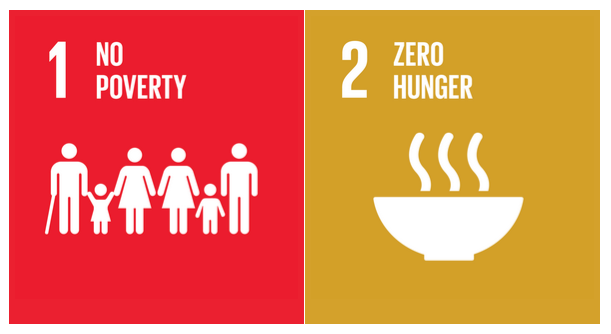As you may of seen on some of my recent social media posts about Environmental & Sustainability and the 37 EU Sustainable Development Goals. I am going to add some additional information on each of the 17 goals. In this blog I talk about…

1 - Poverty
Poverty remains a significant challenge across the globe. The EU has committed to eradicating poverty in all its forms and dimensions.
Achieving this goal requires a multi-faceted approach that addresses the underlying causes of poverty and promotes inclusive economic growth, social protection, and sustainable development.
Strengthening Social Safety Nets:
An effective social protection system is crucial to mitigate the impact of poverty and promote inclusive grow. You can do this by expanding access to healthcare, education, and affordable housing.
Ensuring minimum income guarantees, unemployment benefits, and pensions for vulnerable groups can also help create a safety net that protects individuals from falling into poverty.
Promoting Inclusive Employment Opportunities:
Unemployment is a significant factor contributing to poverty. Governments, in collaboration with businesses and civil society organizations, should prioritize the creation of quality jobs and encourage inclusive employment practices. This can be achieved by supporting entrepreneurship, fostering vocational training programs, and promoting equal opportunities for marginalized groups such as women, youth, and people with disabilities.
Enhancing Education and Skills Development:
Education is a powerful tool for breaking the cycle of poverty. By investing in quality education at all levels, EU member states can equip individuals with the knowledge and skills necessary for employment and economic empowerment. Efforts should focus on reducing educational disparities, providing lifelong learning opportunities, and promoting digital literacy to ensure that no one is left behind in the digital age.
Fostering Sustainable Economic Growth:
Sustainable economic growth plays a pivotal role in poverty reduction. The EU can prioritize investment in sectors with high potential for job creation, such as renewable energy, green infrastructure, and sustainable agriculture. By transitioning to a low-carbon and circular economy, the EU can create sustainable employment opportunities while minimizing environmental degradation.
Tackling Regional Disparities:
Poverty rates vary significantly across regions within the EU. It is essential to address these regional disparities through targeted policies and investments. By promoting regional development, improving infrastructure, and facilitating access to markets, EU member states can ensure that economic growth is inclusive and benefits all regions.
Strengthening International Cooperation:
Poverty is a global challenge that requires collaborative efforts. The EU can play a leading role by partnering with international organizations, governments, and civil society to share best practices and coordinate initiatives. Through development cooperation, knowledge exchange, and capacity-building programs, the EU can contribute to poverty reduction beyond its borders.
Conclusion:
Addressing poverty in the EU is not a solitary endeavour, but a collective responsibility. By implementing these strategies and initiatives, the EU can make substantial progress towards the SDGs, particularly Goal 1: No Poverty.
Eradicating poverty requires a comprehensive approach that encompasses social protection, inclusive employment, education, sustainable economic growth, regional development, and international cooperation. By working together, the EU can build a more equitable and prosperous future for all its citizens, leaving no one behind.
2 - Zero Hunger
Hunger remains a pressing global issue that affects millions of individuals around the world. The European Union (EU), recognizing the importance of combating hunger, has implemented various strategies to address food insecurity and promote sustainable agriculture. Through innovative policies, partnerships, and investments, the EU is making significant strides toward achieving zero hunger within its borders and beyond. In this blog post, we will explore some of the key strategies employed by the EU in its quest to eliminate hunger and build a sustainable future for all.
Promoting Sustainable Agriculture:
The EU recognizes that sustainable agriculture is the key to ensuring long-term food security. The Common Agricultural Policy (CAP), a crucial EU framework, supports farmers in adopting sustainable practices, reducing environmental impact, and enhancing the quality and safety of food produced. Through initiatives such as organic farming promotion, agroecology, and precision farming, the EU aims to maximize crop yields while minimizing resource use and environmental harm.
Strengthening Food Systems:
The EU emphasizes the need for resilient and inclusive food systems that can withstand shocks and provide equitable access to nutritious food. The Farm to Fork Strategy, part of the EU’s Green Deal, seeks to make the food system more sustainable, from production to consumption. By reducing food waste, improving food labelling, promoting local and seasonal products, and encouraging healthier diets, the EU aims to create a more efficient and just food system for all citizens.
Supporting Smallholder Farmers:
Smallholder farmers play a crucial role in food production, particularly in developing countries. The EU recognises their importance and provides support through development programs and partnerships. The EU supports smallholders by promoting sustainable farming techniques, providing access to credit and markets, and facilitating knowledge exchange. By empowering smallholder farmers, the EU contributes to poverty reduction, rural development, and improved food security.
Investing in Research and Innovation:
Innovation is essential for addressing the complex challenges of hunger and sustainability. The EU invests significantly in research and innovation to develop new technologies and practices that can enhance agricultural productivity, reduce environmental impact, and improve food quality. Initiatives such as Horizon Europe and the European Innovation Partnership for Agricultural Productivity and Sustainability (EIP-AGRI) promote collaboration between researchers, farmers, and policymakers, fostering the development and adoption of innovative solutions.
Global Partnerships for Zero Hunger:
The EU recognises that hunger is a global challenge that requires international cooperation. Through partnerships with international organizations, governments, and civil society, the EU aims to leverage collective efforts to eradicate hunger worldwide. The EU supports global initiatives such as the United Nations’ Sustainable Development Goals (SDGs) and contributes to humanitarian aid and development programs in vulnerable regions. By working collaboratively, the EU aims to address the root causes of hunger and build sustainable food systems globally.
Conclusion:
The EU’s strategies for zero hunger demonstrate a comprehensive and integrated approach to tackling food insecurity and promoting sustainability. Through sustainable agriculture, resilient food systems, support for smallholder farmers, research and innovation, and global partnerships, the EU is paving the way towards a future where no one suffers from hunger. While challenges remain, the EU’s commitment and multifaceted strategies offer hope and inspiration for other nations and organizations to join forces in achieving zero hunger and building a more sustainable and equitable world for all. Certainly! Here are some easy solutions that businesses can adopt to contribute to the EU’s strategies for zero hunger:
Reduce Food Waste:
Implement food waste management systems to track and reduce waste at every stage of the supply chain.
Donate surplus food to food banks or organizations that distribute food to those in need.
Educate employees on the importance of reducing food waste and provide training on proper food handling and storage techniques.
Support Local Farmers:
Establish partnerships with local farmers and prioritize sourcing ingredients from them.
Promote local and seasonal products in your marketing and menus to support regional agriculture and reduce carbon footprint.
Participate in farmer’s markets or community-supported agriculture (CSA) programs to directly support local farmers.
Adopt Sustainable Practices:
Incorporate sustainable farming methods by sourcing organic, fair-trade, and sustainably produced ingredients.
Implement energy-efficient practices within your operations, such as installing LED lights and optimizing heating and cooling systems.
Use eco-friendly packaging materials and encourage customers to bring reusable containers or bags.
Educate and Promote Healthy Eating:
Provide nutritional information and promote healthier menu options to encourage customers to make nutritious choices.
Offer educational workshops or cooking classes to raise awareness about healthy eating and sustainable food choices.
Partner with nutritionists or dietitians to provide guidance on balanced diets and sustainable food practices.
Engage in Corporate Social Responsibility (CSR) Initiatives:
Allocate a portion of your business resources to support local food banks, community gardens, or initiatives that address food insecurity.
Organize employee volunteering programs to contribute to hunger relief efforts or sustainable agriculture projects.
Establish partnerships with nonprofit organizations working towards zero hunger and collaborate on joint initiatives.
Support Innovation and Research:
Invest in research and development projects focused on sustainable agriculture, food production, or alternative protein sources.
Collaborate with universities or research institutions to explore innovative solutions for reducing environmental impact and improving food security.
Sponsor and support start-ups or entrepreneurs working on sustainable food technologies or social enterprises focused on hunger alleviation.
Remember, even small steps can make a difference. By adopting these easy solutions, businesses can contribute to the EU’s strategies for zero hunger while demonstrating their commitment to sustainability and social responsibility.
I hope you find this of interest and there are so easy things to get started to protect life and our future. Look out for more information on the other goals.


